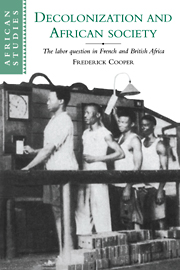Book contents
- Frontmatter
- Contents
- List of tables and figure
- Preface
- List of abbreviations
- Map of French and British colonial Africa
- 1 Introduction
- Part I The dangers of expansion and the dilemmas of reform
- Part II Imperial fantasies and colonial crises
- Part III The imagining of a working class
- Introduction
- 7 The systematic approach: the French Code du Travail
- 8 Family wages and industrial relations in British Africa
- 9 Internationalists, intellectuals, and the labor question
- Conclusion: labor and the modernizing state
- Part IV Devolving power and abdicating responsibility
- Conclusion
- Notes
- Bibliography
- Index
- OTHER BOOKS IN THE SERIES
Introduction
Published online by Cambridge University Press: 22 February 2010
- Frontmatter
- Contents
- List of tables and figure
- Preface
- List of abbreviations
- Map of French and British colonial Africa
- 1 Introduction
- Part I The dangers of expansion and the dilemmas of reform
- Part II Imperial fantasies and colonial crises
- Part III The imagining of a working class
- Introduction
- 7 The systematic approach: the French Code du Travail
- 8 Family wages and industrial relations in British Africa
- 9 Internationalists, intellectuals, and the labor question
- Conclusion: labor and the modernizing state
- Part IV Devolving power and abdicating responsibility
- Conclusion
- Notes
- Bibliography
- Index
- OTHER BOOKS IN THE SERIES
Summary
Much of what has been written about African labor history conforms to a master narrative: more and more Africans went to work, their lives became increasingly dependent on wages, they became conscious of the extent of their exploitation and their vulnerability to the whims of capitalists and the vagaries of markets, and they formed trade unions and conducted strikes, making themselves into a working class. The story's power – the linear momentum that sustains it and the way it ties an African tale into a global one – is also what is problematic about it. The strike wave occurs too soon, among casual and migrant workers as well as relatively long-term ones, and the strikers' success is as much a phenomenon of communities – and complex ties of affiliation and support linking urban and rural areas – as it is of a class of people who can be specifically identified as workers. The general strikes of the 1940s were a class phenomenon in the broadest sense – collective acts of sellers of labor power in general and those closely tied to them. But as such the strike wave is a conjunctural phenomenon, not a pathway to ever deeper unity, and class mobilization occurred most powerfully when it was simultaneously mass mobilization, a populist rising of petty traders, unemployed or semi-employed youth, and of people with strong connections to agricultural and fishing communities. The Mombasa general strike of 1947 was the last event of such scope in that city, similarly with the Dakar strike of 1946 and others.
- Type
- Chapter
- Information
- Decolonization and African SocietyThe Labor Question in French and British Africa, pp. 273 - 276Publisher: Cambridge University PressPrint publication year: 1996



